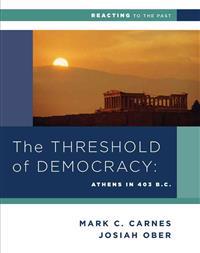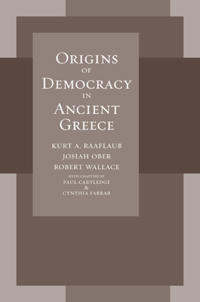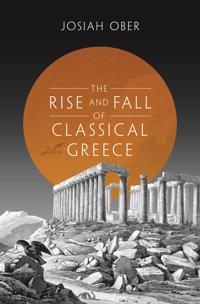The Threshold of Democracy: Athens in 403 B.C. (Häftad)
avJosiah Ober, Mark C. Carnes
ISBN: 9780393937329 - UTGIVEN: 2014-04After nearly three decades of war, Sparta crushed democratic Athens, destroyed its great walls and warships, occupied the city, and installed a brutal regime, the Thirty Tyrants. The excesses of the tyrants resulted in civil war, and, as the game begins, they have been expelled and the democracy res[...]
Origins of Democracy in Ancient Greece (Häftad)
avKurt A. Raaflaub, Josiah Ober, Robert Wallace
ISBN: 9780520258099 - UTGIVEN: 200808This book presents a state-of-the-art debate about the origins of Athenian democracy by five eminent scholars. The result is a stimulating, critical exploration and interpretation of the extant evidence on this intriguing and important topic. The authors address such questions as: Why was democracy [...]
Athenian Revolution, The: Essays on Ancient Greek Democracy and Political Theory (Pocket)
avJosiah Ober
ISBN: 9780691001906 - UTGIVEN: 1998-12-14Mass and Elite in Democratic Athens: Rhetoric, Ideology, and the Power of the People (Övrig)
avJosiah Ober
ISBN: 9780691028644 - UTGIVEN: 1991-07-09This book asks an important question often ignored by ancient historians and political scientists alike: Why did Athenian democracy work as well and for as long as it did? Josiah Ober seeks the answer by analyzing the sociology of Athenian politics and the nature of communication between elite and n[...]
Political Dissent in Democratic Athens: Intellectual Critics of Popular Rule (Pocket)
avJosiah Ober
ISBN: 9780691089812 - UTGIVEN: 2001-11-12Athenian Legacies: Essays on the Politics of Going on Together (Övrig)
avJosiah Ober
ISBN: 9780691133942 - UTGIVEN: 2007-08-27How do communities survive catastrophe? Using classical Athens as its case study, this book argues that if a democratic community is to survive over time, its people must choose to go on together. That choice often entails hardship and hard bargains. In good times, going on together presents few dif[...]
The Rise and Fall of Classical Greece (Inbunden)
avJosiah Ober
ISBN: 9780691140919 - UTGIVEN: 2015-05Lord Byron described Greece as great, fallen, and immortal, a characterization more apt than he knew. Through most of its long history, Greece was poor. But in the classical era, Greece was densely populated and highly urbanized. Many surprisingly healthy Greeks lived in remarkably big houses and wo[...]
Democracy and Knowledge: Innovation and Learning in Classical Athens (Övrig)
avJosiah Ober
ISBN: 9780691146249 - UTGIVEN: 2010-03-15When does democracy work well, and why? Is democracy the best form of government? These questions are of supreme importance today as the United States seeks to promote its democratic values abroad. Democracy and Knowledge is the first book to look to ancient Athens to explain how and why directly de[...]










